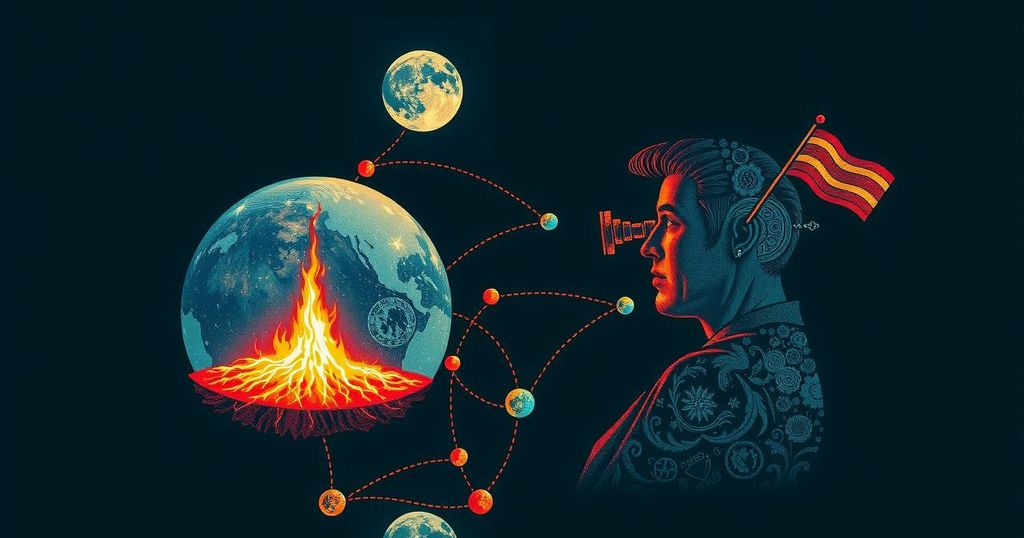The Disturbing Link Between Climate Change and Authoritarianism
The article explores the disturbing relationship between climate change and authoritarianism, illustrating how leaders like Rodrigo Duterte have exploited natural disasters, such as Typhoon Yolanda in the Philippines, to gain power. Research indicates that climate-related events may erode democratic values and facilitate the rise of strongmen globally. The document calls attention to the need for proactive democratic engagement and policy-making to counteract the authoritarian shift driven by climate instability.
In November 2013, the Philippines faced one of the most devastating tropical cyclones ever recorded, Super Typhoon Yolanda, which wreaked havoc with winds reaching 235 miles per hour and a storm surge of 17 feet. The cyclone officially claimed 6,300 lives, though many believe the actual toll to be higher. In response to the calamity, Rodrigo Duterte, then the mayor of Davao City, garnered attention for his dramatic journey to the disaster site, where he accompanied relief efforts with substantial funds and brazenly warned security forces to shoot looters—comments he later downplayed by suggesting they aim for the feet. Elected in a landslide in 2016, Duterte utilized the chaos of the typhoon to amplify his austere political persona. His administration subsequently engaged in a violent anti-drug campaign that resulted in approximately 30,000 deaths, prolonged martial law, and the enactment of laws greatly expanding police powers. This trend reflects a broader global pattern where climate-induced crises appear to facilitate the emergence of authoritarian leaders. As natural disasters like Yolanda become more frequent due to climate change, societies may turn to strongman figures who promise safety and immediate solutions—however brutal their methods may be. Around the world, the rise of authoritarianism parallels increasing environmental upheaval. In India, Prime Minister Narendra Modi has employed divisive rhetoric against Muslims, while in Brazil, Jair Bolsonaro has sought to undermine Indigenous rights and challenged his electoral defeat through insurrection tactics. Similarly, in the United States, actions taken by former President Donald Trump, including the separation of immigrant families and inciting violence against the democratic process, serve as additional examples of this troubling trend. While these leaders emerged in varied contexts, their ascension coincides with heightened awareness of climate change impacts. Research indicates that climate disasters can lead to an uptick in authoritarian governance. For example, a recent study conducted by economists in the UK and Australia explored the correlation between natural disasters and the consolidation of autocratic leadership among island nations from 1950 to 2020. Their findings revealed that natural disasters like hurricanes reduce democratic scores, suggesting that “storm autocracies” may surge as climatic events increase in frequency. Moreover, psychological studies have demonstrated that exposure to climate-related threats can exacerbate negative attitudes towards marginalized groups and increase conformity to authoritarian ideologies. These effects, although often subtle, could contribute to the broader phenomenon of voter support for autocrats, as fear may compel individuals to seek straightforward, albeit oppressive, leadership. Experts assert that authoritarian regimes may leverage their limited human rights obligations to implement effective climate policies, contrasting starkly with democracies that must navigate public opinion and political opposition. As such, maintaining liberal democratic values amidst climate instability will require proactive policy measures that address climate-related fears and social inequalities. Political analysts suggest that climate activism should leverage collective identities centered on shared values like social justice and environmental stewardship to counteract authoritarian urges. Encouraging civic engagement against perceived threats could empower citizens to unite under a constructive vision for the future, rather than succumbing to despair. In conclusion, the interplay between climate change and authoritarianism reveals a critical concern for modern democracies. The experiences following natural disasters can create fertile ground for autocratic sentiments, necessitating urgent actions to preserve democratic principles and promote resilience in the face of environmental uncertainty. As L.V. Anderson aptly encapsulated, “The future is not written; it is what we make it.”
The article investigates the causal relationship between climate change and the emergence of authoritarian political regimes, focusing on the aftermath of natural disasters and their exploitation by leaders to consolidate power. Through examining specific case studies and recent research, the discussion highlights how climate-related crises not only exacerbate societal vulnerabilities but also lend credence to authoritarian figures who offer simplistic solutions to complex problems. The narrative connects global political trends to the increasing frequency and intensity of climate events, shedding light on the potential erosion of democratic values in favor of autocratic governance.
This analysis underscores the urgent need to address how climate change can foster authoritarianism, with leaders exploiting crises to gain power. The findings emphasize the responsibility of democracies to proactively respond to these challenges by bolstering democratic resilience, ensuring inclusive policies, and promoting collective action against climate change. Immediate and strategic responses are essential to safeguard democratic values and prevent the encroachment of authoritarianism amid growing environmental threats.
Original Source: www.fastcompany.com




Post Comment